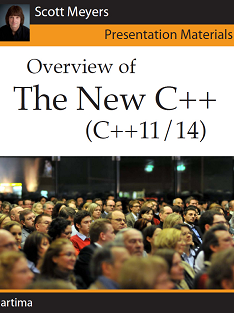C++11/14 Training Materials -- Scott Meyers

C++11 Training Materials Updated -- Now With C++14 Info!
For the seventh time since originally releasing them over three years ago, I've updated my annotated training materials for "The New C++". Until this update, "the new C++" referred to C++11, but with this revision, I'm including treatment of several features from draft C++14 that I believe will make it into the new new standard. As far as I know, this makes my training materials the first "book-like" publication that covers features in C++14.

 Andy's next on move semantics:
Andy's next on move semantics: Roger Orr has written about the history and use of auto in ACCU's Overload 115:
Roger Orr has written about the history and use of auto in ACCU's Overload 115: Tales of C++, Episode 5:
Tales of C++, Episode 5: